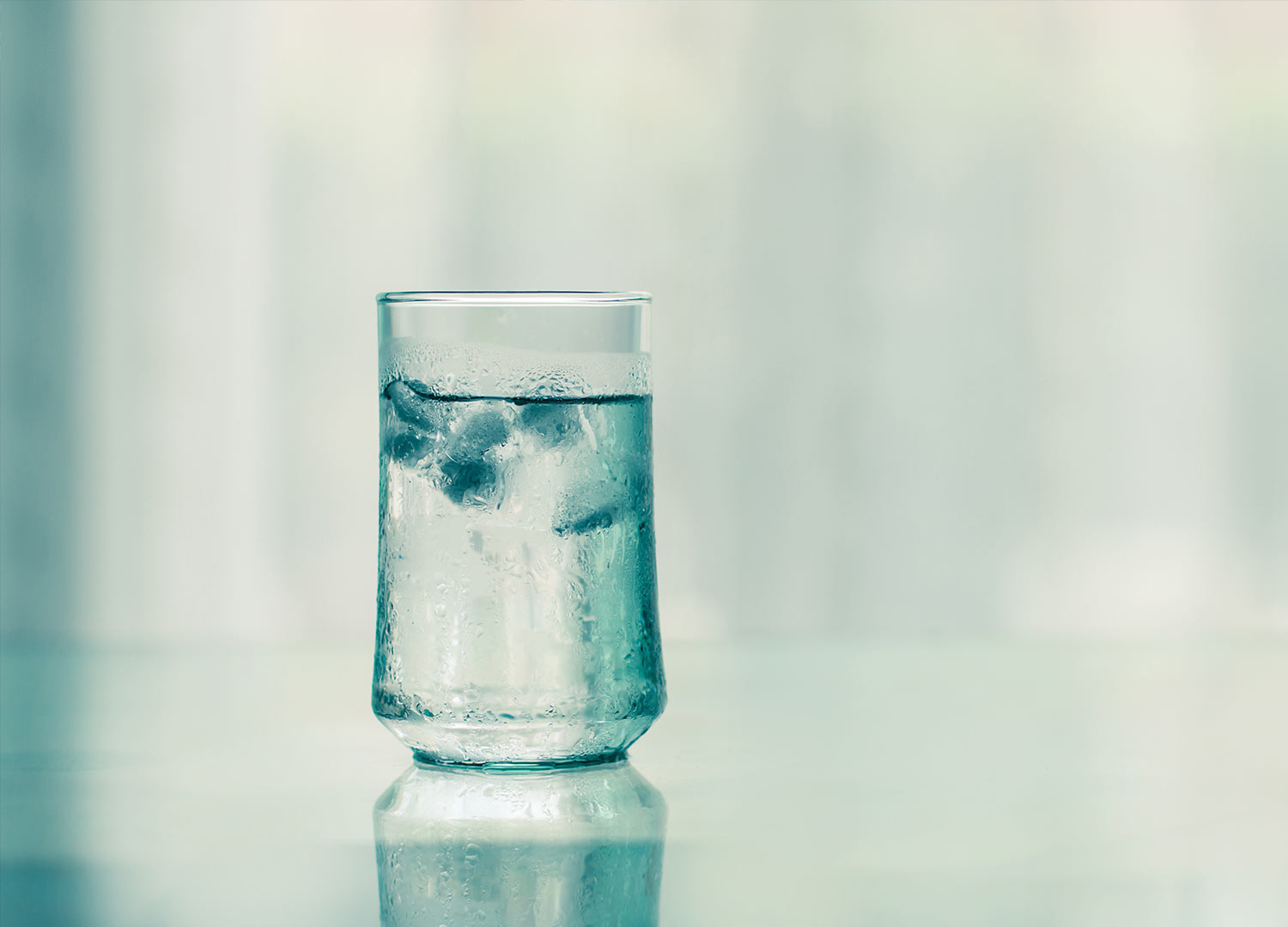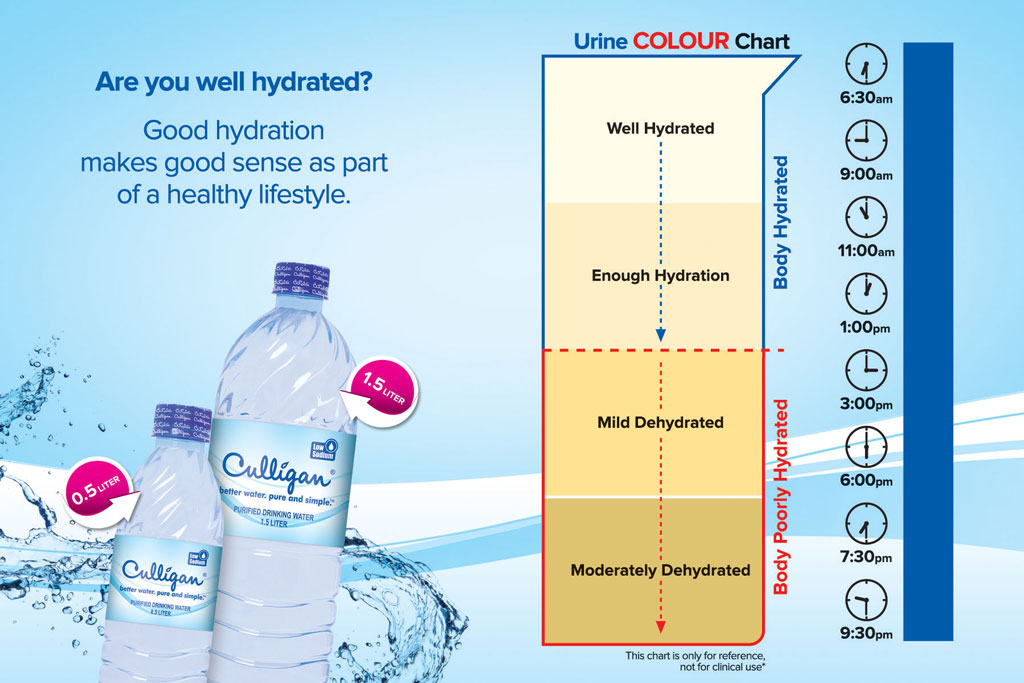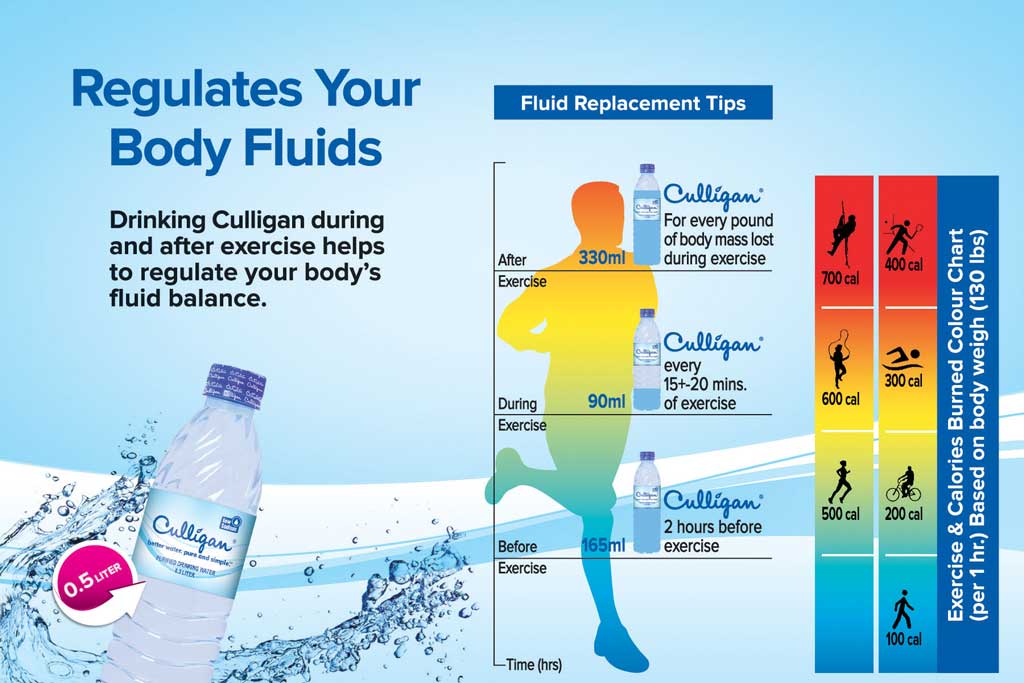About Bottled Water
Proper hydration does more than just keep you from getting thirsty. Hydration is the replacement of body fluids lost through sweating, exhaling and elimination. We need to replenish those fluids to avoid dehydration. It’s just as important to stay properly hydrated at the office, at home and at the gym.
“Thousands have lived without love. Not one without water,” Quote – W.H. Auden
Mild dehydration can cause feelings of lost energy and general illness. If fluids are not replaced quickly, severe and even life-threatening
Signs and symptoms of dehydration include the following:
-
Mild to excessive thirst
-
Dry mouth and/or skin
-
Fatigue
-
Dizziness, nausea and/or headache
-
Muscle weakness
-
Darkened, little, or no urination
-
Increased body temperature
-
Labored breathing
Need help increasing your daily water intake? For specific hydration tips, you might also want to read our Healthy Living and Dehydration article.
So, Are You Drinking Enough Water?
Determining how much water you should drink each day depends upon your body type, health, how active you are and where you live. Consider the following*:
Age: Children get hotter than adults during exercise because they don’t sweat as much. The feeling of thirst actually lags behind water loss, so by the time children feel thirsty, they may already be dehydrated. For seniors, they may not recognize their own thirst signals.
Exercise: If you are active, you lose more water than if you are sedentary. In general, most doctors recommend a few extra cups of fluid for intense workout sessions. Plus, if the weather is exceptionally warm, increase your fluid intake even more.
Environment: Exposure to hot, humid or arid weather requires additional fluids too. During wintertime, your body’s increased efforts to regulate warmth and dryness from heated indoor air, both require additional fluid intake. Learn more in the Year-Round refreshment article.
Illnesses or health conditions: Fever, vomiting and diarrhea cause your body to lose additional fluids that must be replaced. Certain infections also increase your fluid intake needs. On the other hand, other conditions such as heart failure, some types of kidney, liver and adrenal diseases may actually require reductions in your fluid intake.
Pregnancy and/or breast-feeding: As recommended by doctors, pregnant and/or breast-feeding women need additional fluids since large amounts of water are needed by the growing fetus and are lost during nursing.
Traveling: When traveling on an airplane, it is probably a good idea to drink eight ounces of water for every hour you are on board the plane. As you can see, your daily need for water can add up to quite a lot.
Other beverages: Alcoholic beverages, and to some extent caffeinated beverages too, add to your daily water needs since both beverage types act as diuretics, meaning they encourage the body to lose more water faster than consumed.
*Note: It is possible to drink too much water. A condition known as hyponatremia (low sodium levels in the blood caused by too much water) has caused deaths. If you feel concerned about your fluid intake, or don’t know exactly how much you should be drinking each day, it is best to check with your doctor or a registered dietitian to help you determine the amount of water that is best for you.
Keep in mind at least twenty percent or more of your body’s water needs will come from the foods you eat. The rest of your needs could be met from the beverages you drink.
To estimate how much water your household will typically use each month use ourHydration Calculator
Sign Up for bottled water delivery today
Sources: Spigt MG, Kuijper EC, Schayck CP, Troost J, Knipschild PG, Linssen VM, Knottnerus JA. “Increasing the daily water intake for the prophylactic treatment of headache: a pilot trial.” Eur J Neurol. 2005 Sep;12(9):715-8.
Armstrong LE, Pumerantz AC, Roti MW, Judelson DA, Watson G, Dias JC, Sokmen B, Casa DJ, Maresh CM, Lieberman H, Kellogg M. “Fluid, electrolyte, and renal indices of hydration during 11 days of controlled caffeine consumption.” Int J Sport Nutr Exerc Metab. 2005 Jun;15(3):252-65.
Learn to Identify Dehydration Symptoms and Increase Your Daily Water Intake
Why is it important to maintain your daily water intake?
You may not think about dehydration symptoms often, but every time you are thirsty, your body is telling you that it feels dehydrated. Keeping track of your daily water intake is crucial to avoiding dehydration. Water is part of every body process, tissue, cell, and organ, and daily water intake is important to maintain many body functions and to avoid dehydration symptoms. It regulates your body temperature, removes waste from the body, carries nutrients and oxygen and glucose to the cells supplying energy, provides natural moisture to the skin and other organs, cushions joints, and helps strengthen muscles.
What are the major dehydration symptoms?
Regardless of the season, winter or summer, hot or cold, people of all ages are subject to dehydration. The most important key to avoiding dehydration is to drink fluids before you become thirsty. If you wait until you are thirsty, you have probably not met your ideal daily water intake, and it is likely you are already dehydrated.
Since the brain is approximately 75 percent water, it is understandable that early dehydration symptoms, caused by a drop of only 3 to 5 percent of water in the body, may include decreased energy and fatigue, headaches, and dizziness. Other dehydration symptoms may include dry lips, mouth, and skin; nausea; increased body temperature, which can cause heat stroke; and labored breathing. While severe dehydration can lead to more serious health problems, it can be easily avoided by monitoring your daily water intake.
What causes dehydration?
You may suffer from dehydration symptoms for a variety of reasons. Your body loses large amounts of water when you exercise, and so it is important to take frequent breaks to have a drink before continuing your workout. You will also need to increase your daily water intake if you are going to be outside for an extended period of time when the temperature is high. But even when it is cold outside, you still run the risk of dehydration if you do not take the time to drink water throughout your day. No matter what the weather, it is helpful to plan ahead and bring extra bottles of water with you when you go out for you and anyone else in your group.
Additionally, drinking alcoholic beverages or beverages that are high in caffeine, such as coffee or soda, can also dehydrate you, because they behave as diuretics. Therefore, it is important to drink extra water to offset this negative effect on your body. In addition, if you become sick, particularly if you experience a high fever, you are more likely to experience dehydration than when you are healthy. For this reason, it is always important to keep drinking water during an illness to avoid dehydration symptoms that can make you even sicker, even if you are not thirsty.
And remember to watch carefully for dehydration symptoms in young children and older adults, as both age groups have a high risk of suffering from dehydration. In addition, pregnant and nursing women need to increase their daily water intake to avoid dehydration symptoms and to stay healthy.
Tips to combat dehydration symptoms:
If you are at home most of the day, fill a container with your water for the day. You can either drink your water plain or add flavoring to it. When the container is empty, you will know that you have met your goal for your daily water intake.
- Keep a small bottle of water with you in your car, in your backpack, or at your desk to drink throughout the day. Only refill water bottles that are intended to be reused, and always wash your bottle thoroughly between uses so that your water is always fresh and clean.
- Develop a “hydration habit” to keep your daily water intake consistent – a glass in the morning, at each meal, and before bed. If it helps, jot down a note each time you drink water so you can more easily keep track of how much water you’ve had to drink that day.
- To help the rest of the family stay hydrated, serve a pitcher of water during meals.
If you notice dehydration symptoms in yourself or in someone you know, get to a water source immediately.
Where there’s water, there’s life. Every system of the body depends on water for survival. Water regulates body temperature and delivers oxygen and nutrients to the entire body. In addition, water is crucial for helping the kidneys remove bodily waste. Water even plays an important role at the cellular level by acting as the catalyst for bodily chemical reactions.
Water can also aid in weight loss. Not only will drinking water before and during your meal help you feel full, water can also help provide energy without calories and is never stored as body fat. Even better, water is very important for fitness. When you exert yourself, you tire more easily, your stamina is reduced and your muscles begin to struggle because your body needs its most important ingredient, water. Properly hydrated, your body can function at its peak. For more information, check out our Hydration information.
“Water sustains all.” Quote – Thales of Miletus – 600 B.C.
With such busy lives, it may be difficult to drink enough water everyday. The Nutrition Information Center at The New York Hospital-Cornell Medical Center offers the following easy tips for maintaining proper hydration:
- Make water your preferred beverage
- Drink chilled water for improved taste.
- Drink at the same times each day
- Don’t wait until you’re thirsty to drink water. By the time you feel thirsty, you probably have already lost two or more cups of your total body fluids.
- Develop a “hydration habit” by having a glass of water when you wake up, one with each meal and one at bedtime.
- Convenience is also the key to staying properly hydrated, so carry a bottle of water with you as you commute to work, run errands or enjoy a day at the beach.
- Keep single-serve bottles of water in your car, backpack or desk.
- Maintain easy access to water by keeping your refrigerator or cooler well-stocked at home or at the office.
- Take a water break instead of a coffee tea or soda break. Caffeine acts as a diuretic, causing you to lose water through increased urination.
- Alcoholic beverages have a similar effect.
- Hydrate before, during and after exercise. Don’t underestimate the amount of fluids lost from perspiration.
- At social gatherings, substitute alcohol with water and a twist of lime or lemon
- Choose a bottle of water instead of soft drinks or juice when you’re out for lunch or dinner with friends.
- Add a slice of lemon or lime for flavor
- Don’t forget that common maladies such as colds and the flu can frequently lead to dehydration. So, when you’re sick, keep a large bottle of water next to your bed to sip it throughout the day without having to get up.
- Check your urine to make sure you’re getting enough water. You should urinate every two to three hours during the day, and it should be clear to pale yellow in color.
Now that you’ve discovered some useful information about water, perhaps you are ready to incorporate bottled water into a healthier lifestyle. It’s easy. You don’t need to revamp your entire diet or daily routine, just follow a few of these easy tips above and you’ll be well on your way to getting enough water for your body. Water is calorie-free, inexpensive and conveniently available. So remember to take bottled water with you as you go about your daily routine. It’s never been easier to stay properly hydrated with bottled water.
‘Working-out’ Your Water Intake
In typical workout routines, it is often suggested to drink 2 glasses of water before commencing exercise, drink 1 glass during, and to replenish with a glass for every hour of activity. This action is often referred to as re-hydration. Sports drinks employ methods for quicker absorption of water by adding salt and sugars that the body uses during exercise. Salt helps the body absorb the water quicker, and during highly dehydrating activities such as running, the body requires the immediate replacement of lost salt, water, and basic sugars, used as instant energy. However many sports drinks often replenish too much salt or sugar as they are designed for extremely physically demanding activities. Too much salt will actually counteract the absorption of water and reverse effective of re-hydration.
Because sports drinks generally contain too much sugar, it may inhibit the body’s ability to fend off lactic–acid build-up, often the result of extended aerobic activities (lactic-acid build-up causes the burn you feel in your legs from long runs). Most of these drinks are flavoured to be appealing and do little to properly replenish the body with what it needs. Drinks such as these are also under scrutiny by researchers to determine whether they contribute to the formation of calcium build-up in kidneys and cause bladder infections.
An ideal home recipe for a sports drink is:
1 part juice (fruit juice from concentrate) for the sugar
1 part bottled water
1/2 teaspoon of salt
Your body will tell you if you need a sports drink such as this, or if water will be good enough. If it tastes salty, your body doesn’t require a ‘sports’ drink, and water should suffice. Listening to your body’s signals is important. That’s why this simple home recipe is ideal.
The problem with some commercial drinks is that they use artificial flavorings that can trick your taste buds and prevent you from picking up on the clues your body is giving you about what it needs. As a result, you might be taking in extra salt and sugar that you just don’t need.
A homemade sports drink has the added benefit of using fruit juice rather than sugary punches or raw sugar. Fruit juices contain either fructose or glucose, which are both simple sugars and easier for the body to absorb and convert into energy. After completing your exercise routine, re-hydrate with plain water.
Protecting Your Child from Dehydration
Little ones need plenty of water for their busy bodies, especially on hot days. When planning outdoor activities, be sure to pack a bag filled with snacks, sunscreen, a hat and plenty of cool water. To prevent dehydration on hot days, it is best to limit outdoor activities to the cooler times of the day – avoid the hours of 11 a.m. to 2 p.m.
For the child who doesn’t want to drink water, try the following:
- Use colourful and interesting-looking plastic cups, sports bottles or sippey cups
- Create your own packaging – personalize your child’s special cup or bottle by adding his/her name, along with a fun design
- Try using straws in bright colours and crazy shapes – your child will get a thrill out of watching the water wind its way through all of the loops and curves
- Keep the water cool – especially on a hot day
- Limit beverage choices – try not to stock the fridge with a lot of tempting sugar- and caffeine-filled drinks that could derail your efforts
- Be a good example by drinking plenty of water, too!
- Try adding a slice of fruit – this is tasty and fun for kids!
We Deliver!
Get crisp, refreshing bottled water delivered directly to your home or office. Together, we’ll develop a delivery schedule that fits your lifestyle so that your drinking water supply is conveniently delivered and always available. After all it’s Purely Refreshing. Personally delivered that actually simplifies your life ….. Now that refreshing!
To estimate how much water your household will typically use each month use Our Hydration Calculat or Sign Up.
Disclaimer:
*This article is not meant to diagnose, treat or cure any kind of a health problem. These statements have not been evaluated by any regulatory authority. Always consult with your health care provider about any kind of a health problem and especially before beginning any kind of exercise routine.
Sources: Spigt MG, Kuijper EC, Schayck CP, Troost J, Knipschild PG, Linssen VM, Knottnerus JA. “Increasing the daily water intake for the prophylactic treatment of headache: a pilot trial.” Eur J Neurol. 2005 Sep;12(9):715-8.
Armstrong LE, Pumerantz AC, Roti MW, Judelson DA, Watson G, Dias JC, Sokmen B, Casa DJ, Maresh CM, Lieberman H, Kellogg M. “Fluid, electrolyte, and renal indices of hydration during 11 days of controlled caffeine consumption.” Int J Sport Nutr Exerc Metab. 2005 Jun;15(3):252-65.
It’s Important to Drink Water No Matter What the Season
In the summer months, it is important to drink water for both refreshment and proper hydration. But as the mercury dips down, the body works harder both to keep warm and prevent dryness from the use of indoor heaters. So, it is just as important for everyone to drink water and stay hydrated during the wintertime as other times of the year. In fact, even mild Dehydration can have negative effects including headaches, irritability, fatigue, and a lack of ability to concentrate. No matter what the temperature, keeping your daily water intake up can help prevent these problems.
While a crisp, cold drink of water may sound appealing in the summer, in the winter you are more likely to crave something warm and soothing. Here are some important tips to help maintain your daily water intake during the fall and winter months.
In the colder months try adding different types of liquids to your diet, such as:
- Herbal tea
- Hot cocoa
- Hot water with lemon
- A warm bowl of soup
As an added bonus, soup during the winter can meet your water needs and add more vegetables (plus important vitamins) to your diet. And, when recipes require water as an ingredient, be sure to use bottled water for the fullest flavor.
Fight Illness – Drink Water!
It happens almost every time there’s a seasonal change – the sneezing, the coughing. There’s no way around it – you’ve caught a cold. And probably one of the best things you can do to fight a cold – is to drink water and stay hydrated. Start off by increasing your daily water intake – and then keep it up. For specific tips, see Hydration and Healthy Living pages .
Craving something different than a plain drink of water? From orange juice to chicken soup, there are many other delicious ways to stay hydrated that will get you back on your feet and back to enjoying the season.
Treating Your Skin Right
Cold winter air can pull the moisture right out of your skin, making it feel dry and flaky. In order to combat this problem, you can carry moisturizer and lip balm with you at all times, and you can also run a humidifier in your home, which will keep the air – and your skin – moist. But most importantly, staying hydrated in the winter months by drinking water will help your skin maintain its moisture.
Remember – it doesn’t matter what the temperature is outside. Your body always needs water in order to run at an optimal level. Make proper Hydration a part of your routine all year to look and feel great!
Disclaimer:
*This article is not meant to diagnose, treat or cure any kind of a health problem. These statements have not been evaluated by any regulatory authority. Always consult with your health care provider about any kind of a health problem and especially before beginning any kind of exercise routine.
Sources: Spigt MG, Kuijper EC, Schayck CP, Troost J, Knipschild PG, Linssen VM, Knottnerus JA. “Increasing the daily water intake for the prophylactic treatment of headache: a pilot trial.” Eur J Neurol. 2005 Sep;12(9):715-8.
Armstrong LE, Pumerantz AC, Roti MW, Judelson DA, Watson G, Dias JC, Sokmen B, Casa DJ, Maresh CM, Lieberman H, Kellogg M. “Fluid, electrolyte, and renal indices of hydration during 11 days of controlled caffeine consumption.” Int J Sport Nutr Exerc Metab. 2005 Jun;15(3):252-65.
|
Your Family + Culligan Bottled Water = A Better Lifestyle To calculate a starting point of your ideal water intake, divide your weight in half. This will give you the minimum number of ounces of water you should be drinking every day. |
||
|
Body Weight |
||
| 180 lb. | 60 lb. | 130lb. |
|
Minimum Ounces Needed Daily |
||
| 90 oz. | 30 oz. | 65 oz. |
| 11-12 glasses | 3-4 glasses | 8-9 glasses |
| Even more needed for: smokers, dieters, active people, people living in high altitudes, seniors, pregnant women, nursing mothers, babies and school-age children, prescription drug takers, drinks of dehydrating beverages. | ||





